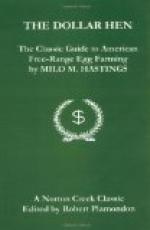Less Ham and More Eggs.
Certainly we, as a nation, are rapidly becoming eaters of hens and of hen fruit. Reasons are not hard to find. Poultry and eggs are the most palatable, most wholesome, most convenient of foods. Our demands for the products of the poultry yard grows because we are learning to like them, and because our prosperity has grown and we can afford them.
Another reason that the consumption of eggs is growing is because the condition in which they reach the consumer is improving. The writer may say some pretty hard things in this work about the condition of poultry and eggs as they are now marketed, but any old-timer in the business will tell you stories of things as they used to be that will easily explain why our fathers ate more ham and less eggs.
Yet another reason why the per capita consumption of hens as measured in pounds or dollars increases, is that the hen herself has increased in size; whereas John when he was Johnnie ate a two-ounce drumstick, now Johnnie eats an analogous piece that weighs three ounces. Perhaps, also, we have a growing respect for the law of Moses, or may be vegetarians who think that eggs grow on egg plants are becoming more numerous.
Our consumption of pork per capita has, in the last half century, diminished by half, our consumption of beef has remained stationary, but our consumption of poultry and eggs has doubled itself, we know not how many times, for a half century ago the ancestor of the industrious hen of this age serenely scratched up grandmother’s geraniums and was unmolested by the statisticians.
Who Gets the Hen Money?
Seven hundred millions of dollars is a lot of money. Who gets it? There are no Rockefellers or Armours in the hen business. It is the people’s business. Why? Because the nature of the business is such that it cannot be centralized. Land and intelligent labor, prompted by the spirit of ownership, is necessary to succeed in the hen business. Land the captains of industry have not monopolized, and labor imbued with the spirit of ownership they cannot monopolize. The chicken business is, in dollars, one of the biggest industries in the country. In numbers of those engaged in it, the chicken business is the biggest industry in the world—I bar none. Why is this true? Primarily because the hen is a natural part of the equipment of every farm and of many village homes as well. It is these millions of small flocks that count up in dollars and men and give such an immense aggregate.
More than ninety-eight per cent. of the poultry and eggs of the country are produced on the general farm. The remaining one or two per cent. are produced on farms or plants where chicken culture is the cash crop or chief business of the farmer. It is this business, relatively small, though actually a matter of millions, that is commonly spoken of as the poultry business, and about which our chief interest centers. A farmer can disregard all knowledge and all progress and still keep chickens, but the man who has no other means of a livelihood must produce chicken products efficiently, or fail altogether—hence the greater interest in this portion of the industry.




